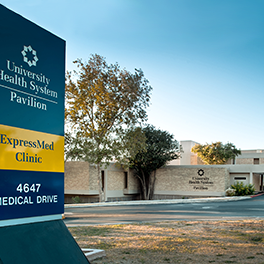Lymphedema happens when lymph fluid builds up in your lymph nodes or vessels. It most commonly occurs months or years after surgery or radiation for cancer treatment. It is a chronic condition and, while there is no cure, can be managed.
At the Medical Center Pavilion clinic, we are able to see patients with acute lymphedema that results from surgery, chemotherapy or post cancer surgery. The clinic is not equipped to treat patients with long standing or chronic lymphedema.
Causes of Lymphedema
Lymphedema is a blockage in the lymphatic system. This blockage causes an accumulation of fluid in tissues of the body that results in swelling, most often in the arms and/or legs.
Lymphedema may occur after:
- Infection
- Radiation for cancer
- Removal of lymph nodes, generally for cancer
- Surgery
- Trauma
When the lymph nodes are damaged by any of the factors above, lymph fluid does not drain properly into your body. Instead, it will build up underneath the skin, causing swelling. This swelling usually occurs in:
- Abdomen
- Both arms
- Both legs
- Face
- Groin
- Head and neck
If left untreated, the swelling could cause sores and other skin problems.
Lymphedema Therapy
Managing the symptoms of lymphedema with a combination of therapy methods is the best option for living with it. University Health offers lymphedema therapy at our Medical Center Pavilion clinic:
Lymphedema therapy involves:
- Measurement of your limbs
- Exercises to assist with drainage
- Manual therapy to assist with drainage
- Specialized bandaging of the affected limb to assist with drainage
- Skin and nail care
- Therapeutic exercises
- A treatment plan that can include high frequency of visits over a short period of time
What to Expect During Your Session
During your session, your physical therapist will compare the swollen limbs to the normal ones to see how much they’ve swollen. They will take accurate measurements of the swelling.
Then, your therapist may manually massage your arms or legs to assist with draining the excess fluid.
Your therapist may recommend compression bandages that you can wear at home. These compression bandages will help with blood and fluid flow in your limbs.
Your therapist will train you and your family on some techniques that can be performed at home for management of this condition.
Benefits of Lymphedema Therapy
Managing your lymphedema will give you a better quality of life. Lymphedema therapy can prevent many of its symptoms, which may include:
- Aching or pain near the affected area
- Infection
- Skin that feels tight and stiff
- Trouble moving your joints
- Weakness
How to Manage Lymphedema at Home
With proper care, you can manage your lymphedema at home. Some important things to remember are:
- Avoid heavy lifting
- Don’t put any needles in your affected arm
- Eat foods low in salt and high in fiber
- If you wear a bra, be sure it is not too tight, or it will affect your swollen arm
- Keep the affected area clean and dry, and apply lotion after it dries
- Protect your arms and legs from the sun
- Talk with your doctor about what exercises are right for you
When to Call Your Doctor
If you are having trouble managing your lymphedema, or notice that the swelling is getting worse, call your doctor.
If you notice any of these symptoms, you might have an infection:
- Blisters
- Fever
- Rash
- Redness



